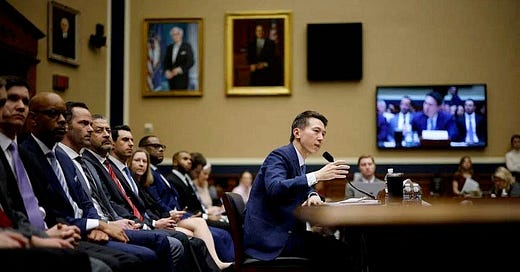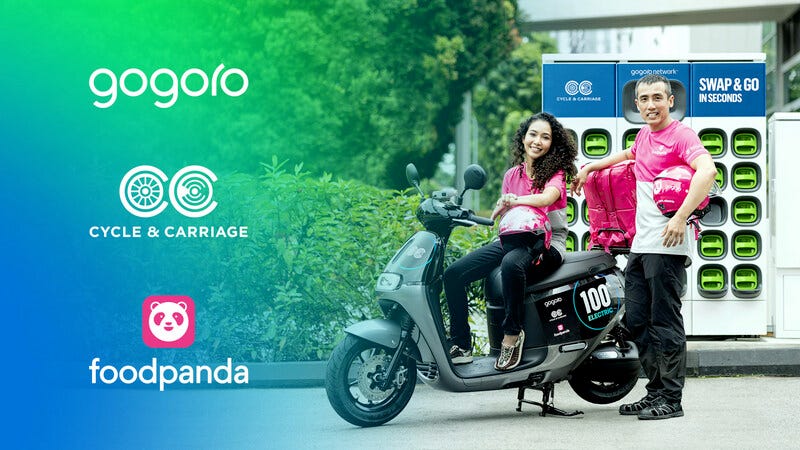Welcome back and happy Monday,
Last week saw the passing of Gordon Moore, a co-founder of Intel. He is best known for Moore’s Law, a legendary prediction made in 1965 which stated that the number of transistors on a silicon chip roughly doubles every two years. The theory holds true to this day and is, put simply, a benchmark for how the performance and capabilities of computers and electronics have evolved across numerous decades. (Related book recommendation.)
Perhaps fittingly, this week has a lot of semiconductor news including a fascinating deep dive into TSMC—the secretive Taiwanese firm that helps make electronic devices what they are today—as well as the ongoing battle for silicon dominance between the US and China and India’s continued rise as an alternate manufacturing destination.
Elsewhere, Tencent saw its first-ever annual revenue decline; Terra co-founder Do Kwon was (finally) arrested; and there are problems for more crypto companies—Zipmex in Southeast Asia and high-profile figure Justin Sun.
See you again next week,
Jon
Stories in focus
The TikTok circus goes to Washington
No roundup this week would be complete without touching on TikTok after CEO Shou Zi Chew faced US lawmakers.
The session, which was highly memorable, generated catchy headlines (“The TikTok hearing shows Congress is the problem”) and prompted ridicule from users of, you guessed it, TikTok for the combative approach and some, quite frankly, stupid questions. In case you’re wondering, they included whether the app can track pupil dilation to fine tune its algorithm. But we’re well-accustomed to non-techy US politicians at this point… just ask Mark Zuckerberg.
But the key points from last week are that the US government continues to see TikTok as a national threat which spies on the US citizens. TikTok—which continues to stress that it is not a Chinese company, unlike its Mainland cousin Douyin—has proposed a workaround with its Project Texas programme, but that doesn’t seem to satisfy lawmakers in the US who have already banned the app on government employee work devices.
Still the app continues to enjoy a massive profile stateside, hitting 150M US-based users up from an-already-impressive 100M in 2020.
It isn’t just TikTok, too. CapCut—parent firm ByteDance’s video editing software that’s likely well known to parents of teens like me—is now catching the attention of the media. The Wall Street Journal reported on the “wildly popular” app that accompanies TikTok and has actually seen higher downloads in recent times.
Apple makes more supply chain moves in India
There’s a lot happening with India’s ongoing emergence as a manufacturing alternative to China. Reuters—and my former colleague Munsif Vengattil—are hot on the chase after reporting some significant developments.
Pegatron, a key Apple supplier, is said to be in talks to open its second India-based factory at a proposed location near Chennai in the south of the country. This is particularly notable since it was just six months ago that Pegatron opened its first facility with an investment of $150M. The new factory would focus on assembling new iPhones, according to Reuters.
Reuters wrote the previous week that Foxconn appears to have won the contract to manufacture AirPods in India, and that in turn could see it develop a new $200M factory in the country.
The news cycle isn’t just about contracts—and that’s a murky world, by the way, which is often filled with unsubstantiated stories leaked by government officials hopeful of landing deals or applying pressure. Apple is looking to amend India’s labour laws to put them more closely in line with those of China.
Bloomberg reported last week that India’s southern Tamil Nadu state, where Apple’s top supplier Foxconn Technology Group operates the nation’s largest iPhone plant, is considering passing new rules that will make factory shifts more flexible.
Inside the secretive Taiwanese powerhouse making Apple phones and much more
Wired has a deep look inside TSMC, the company at the centre of the global semiconductor industry, in a great long read that touches on:
The sheer complexity of what TSMC (and its 60,000 employees) does
The firm’s culture—and the purity of its mission
Why nobody (not even Americans) can do it like Taiwanese engineers
TSMC’s importance in the geopolitical tensions between China and Taiwan
How it uses AI processes and VR working but human skill remains essential on site
China
Tencent reported its first-ever drop in annual revenue as China’s Covid pandemic and regulatory crackdown hit hard—annual revenue for 2022 was $81B, a drop of 1% link


Middling financials from Tencent are one for the scrapbook
Meanwhile, Xiaomi reported a record drop in fourth-quarter revenue as sales dipped by nearly 23% and net come fell by 67% link
But Meituan did beat its Q4 estimates with a 21.4% revenue jump link
Tron Founder Justin Sun is being sued by the US SEC on securities and market manipulation charges, which includes claims his companies created an "extensive wash trading" program to boost their trading volume link
China’s market regulator published updated rules on online advertising, including oversight of recommendation algorithms link
Google flagged apps by Pinduoduo as malware after multiple Chinese security researchers accused the e-commerce firm of making Android apps including malware to monitor users link
Former Tsinghua Unigroup Chairman Zhao Weiguo is the latest high-profile figure ensnared in an industry-wide corruption after China’s top anti-graft watchdog began an investigation link
Kai-Fu Lee, former head of Google China and a high-profile investor, announced plans to establish an artificial intelligence company that will ‘go beyond’ being a Chinese version of ChatGPT link
India
India may have banned TikTok nearly 3 years ago, but a Forbes report shows that personal data of Indian citizens who once used the app remain widely accessible to ByteDance and its employees link
The Indian government’s ONDC programme that’s designed to democratise e-commerce has expanded to mobility services link
Indian edtech startup PhysicsWallah in talks to raise around $250M at a valuation of $3.3B link
YouTube is shutting down live social commerce app Simsim less than two years after acquiring the Indian startup link
Tata Group is said to be considering investing $2B more into its Tata Neu super app to fund growth over the next 2 years link
Southeast Asia
Fintech startup Kredivo, which previously aborted a plan to go public via a SPAC, raised $270M led by Mizuho Bank link
Troubled Southeast Asian crypto exchange Zipmex is under increasing pressure as its rescue investor V Ventures missed a fourth tranche payment, leaving the company unable to pay certain staff and at risk of liquidation link
Reebelo, a marketplace for affordable and sustainable consumer electronics, raised $29M for future plans which will include a US expansion link
Mental health platform Thoughtfull raised $4M led by Temasek subsidiary Sheares Healthcare Group link
Taiwanese electric bike firm Gogoro plans to enter Singapore in partnership with Foodpanda link
Wild one here: Four immigration officials in Thailand face arrest after being accused of an immigration scam that involved abducting a Chinese national and his interpreter and extorting nearly $30,000 in cryptocurrencies link
Taiwan
Taiwan’s exports of integrated circuit chips to China and Hong Kong fell for a fourth month in February as Washington-Beijing tensions simmer and demand for electronics continues to drop off. link
South Korea
Do Kwon, the founder of Terra and Luna which crashed and burned last year setting off a chain of crypto industry implosions, has been indicted in US after he was arrested in Montenegro using apparent false documents link
Kakao Mobility acquired Splyt, which integrates and inter-connects ride-hailing and travel services, in an undisclosed deal link
Kream, an Asia-focused reseller platform that span out of Line parent Naver’s former photo app Snow, raised a $168M Series C at a valuation of $742M link
Apple Pay is now available in South Korea link
Japan
Toshiba’s board approved a $15B buyout offer from a consortium of domestic companies (Japan Industrial Partners) led by a Japanese private equity fund, according to people familiar with the talks link








